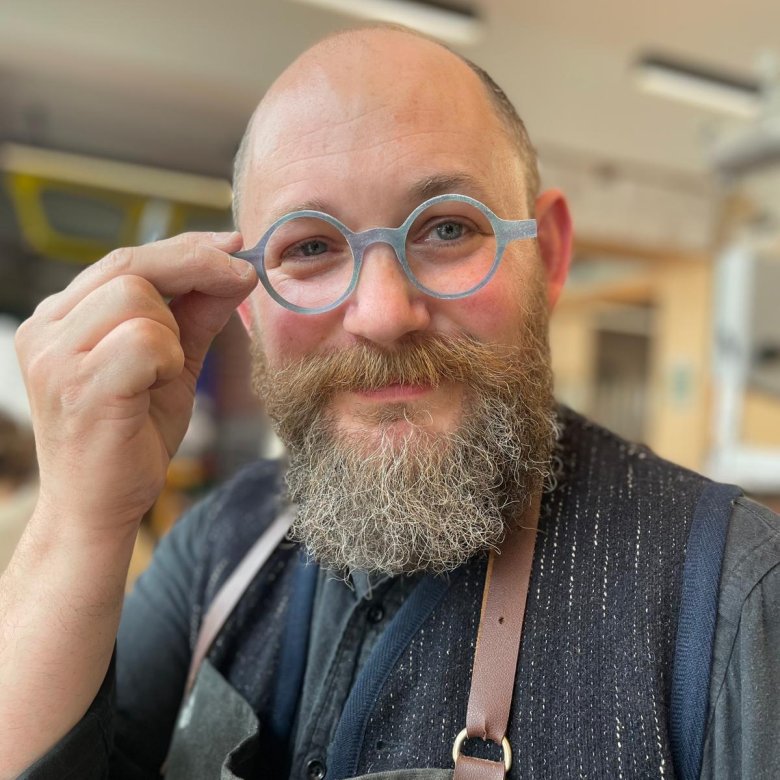Barnaby Lickens-Richards on illustration, AI and nourishing your creative practice
27 June 2024

Barnaby Lickens-Richards is an illustrator, writer, comic book artist and educator. With over twenty years of experience across publishing, editorial, applied products, and small press comics, he leads Falmouth’s online master’s degree in Illustration – a course which unites a talented community of practitioners. We chatted to Barnaby about his routes into illustration, the highlights of his commercial career and the value of academic nourishment.
When did you first realise you were interested in illustration?
During my final year studying History of Art at Manchester University my father sent me a book called The Depository by Andrzej Klimowski, which is in the tradition of the ‘wordless novel’, and it inspired me to want to communicate in the same way. I started drawing my own wordless narratives, and it was a while before a friend mentioned to me that this was illustration. The term can sometimes be a red herring, as it led me to think that I should be able to turn my hand to all sorts of other things which are also classified as illustration, rather than concentrating on developing this one burning preoccupation - this thing that I had felt compelled to do.
To this day, words from my old lecturers ring in my ears, and I can draw a direct line between the work I produced then and the work I produce now.
Over time I came to understand that illustration was a communication tool to be negotiated by each practitioner, and not a suite of commercial outputs. Andrzej’s book, with its note tucked inside from my father, is my prized possession - it reminds me to stick to my own path.
You completed your own master’s studies with Falmouth in 2003 – what was the most valuable thing you took from the experience?
Firstly, being within a group and seeing what others did better than me led to understanding my own strengths and weaknesses. Secondly, the time it afforded me to concentrate on my practice and the audience I had to discuss my successes and failures with. Thirdly, being part of this great culture of learning which Falmouth offers (and which we now offer online).
I loved being a student and being in academia generally, which ultimately led to my working within higher education. To this day, words from my old lecturers ring in my ears, and I can draw a direct line between the work I produced then and the work I produce now. My MA started an internal and ongoing conversation for which I will always be thankful.
Having worked with clients including The Guardian, The Observer Magazine, The Independent, Paul Smith and PlayStation, has there been a project that’s been particularly rewarding to be part of?
Having a regular weekly spot in a couple of national newspapers over the years was very validating. Working freelance, I often felt like a lone ranger, so having affiliations with organisations like the ones you list felt important to me. I suppose it all comes down to how one defines ‘rewarding'! The self-published projects – the comics I contributed to, other people's zines, things which had no immediate financial benefit but afforded me the space to do exactly what I wanted – those were certainly the most fulfilling.
What has been the most surprising thing about leading Falmouth’s online community of illustrators?
How friendly and personable it is. It might sound strange, but our online MA fosters a great sense of community for students and staff alike. I think the concept of online study can scare people – and certainly online learning isn’t for everyone – but the idea that everything is just pre-recorded and that everyone works in a vacuum is a complete myth. On a personal level, leading the thing, I’m extremely proud of the team of lecturers, supervisors and tutors we have put together. They are a great bunch who I love working with (and who I am slightly in awe of!).
Recent discussions around AI-generated artwork have been very interesting; some students are keen to embrace it wholeheartedly while others are developing creative resistances.
Why do you think people should study illustration to master’s level?
As I mentioned above, my MA embedded a critical apparatus within me that has sustained my practice for well over twenty years now. I think people should study illustration at master’s level if they feel their practice would benefit from nourishment in some way. MAs sit between BAs and PhDs so it’s important to realise that it’s an academic and research-based nourishment.
Master’s typically benefit students who have a BA (in illustration or a related field) and have gained some experience beyond this. This is because such a person will have a sharpened awareness regarding what they want to achieve – even if they cannot put a finger on exactly what that is – and they will be able to lean on the key skills they have already developed.
What do you think the future of illustration will look like?
Gosh, well if I knew that! Recent discussions around AI-generated artwork have been very interesting; some students are keen to embrace it wholeheartedly while others are developing creative resistances. Certainly, it has opened a dialogue about what it means to be a maker as well as an illustrator. The module I run – Process and Practice – is very much concerned with our role as makers, nurturing practice to remain meaningful within itself. Ultimately, illustration is a communication tool. It is not about how it can be used, it's about how you choose to use it, and as such, the future of illustration is wide, diverse and evolving.




